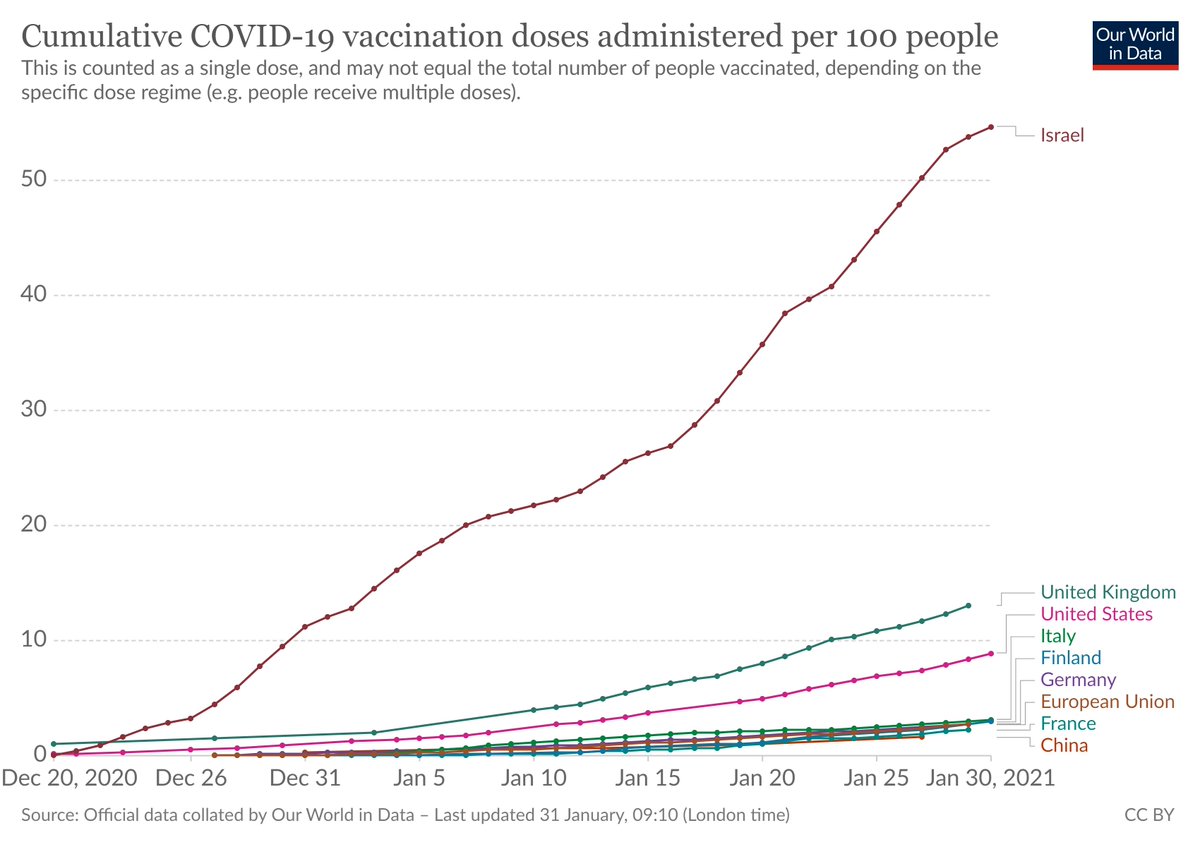Has the EU failed in its Covid vaccine programme? Thread.
Progress slow; US 9% of population vaccinated; EU 3% (but only 3 weeks behind!). Some countries doing better (Israel 55%, UK 13%). But probably best not to compare EU performance to much smaller countries. 1/n
Progress slow; US 9% of population vaccinated; EU 3% (but only 3 weeks behind!). Some countries doing better (Israel 55%, UK 13%). But probably best not to compare EU performance to much smaller countries. 1/n
A lot of blame on the EC, which the EU decided should lead vaccine purchase programme. Why is EU so slow (although still only 3 wks behind US, for now)? Brussels bureaucracy? This @DeutschJill & @swheaton piece suggests answer is nuanced. 2/n https://www.politico.eu/article/europe-coronavirus-vaccine-struggle-pfizer-biontech-astrazeneca/
EU decided to act with one voice in negotiations, to avoid pharma companies picking off individual countries in one-by-one secret negotiations. This is good, esp. for smaller/poorer countries, which would've been left at the end of the queue if negotiating individually. 3/n
A competitive bidding war for scarce vaccine supplies, between EU countries, would've also bid up the price of vaccines a lot even for the Germanies of Europe.
In fact, the EU has gotten a low price due to its weight and bargaining power. But then this may be a bad thing! 4/n
In fact, the EU has gotten a low price due to its weight and bargaining power. But then this may be a bad thing! 4/n
The cost of the continuation of the pandemic is very high and it may be, as the @POLITICOEurope piece suggests, that the EU is getting the vaccines later partly because they have bargained harder on price that the UK or the US. If so, this is an own goal. 5/n
The cost of vaccines is peanuts in comparison to cost of the pandemic. EC should've pushed for capacity expansions, not price cuts. See e.g. paper here, pointing out that capacity expansion benefits far outweigh the costs. 6/n https://twitter.com/MaxCRoser/status/1355659730186866689
Then again, it is not clear how easy that would've been. The @POLITICOEurope piece quotes an industry consultant saying it takes five years to build a vaccine factory by the book. 7/n
Perhaps what EC should've done is to have forced clauses on contracts that successful vaccine developers must license their vaccines for production in competitors' factories, as is now happening w/ Sanofi producing the Pfizer/BioNTech vaccine? 8/n
A further hitch is the widespread irrational vaccine doubt in Europe. (I refuse to use the word 'skepticism' for this.) EC has had to drive a harder bargain in terms of making the developers accept liability for any undetected side effects, to ensure widest possible takeup. 9/n
Finally, in a way Europe has failed because of too little Brussels involvement, not too much! Bureaucracy of having to have medical approvals and contracts accepted by 27 member countries slowed down the procurement process. Would've been faster if Brussels had more power. 10/n
This bureaucratic slowness -- due to EU being an intergovernmental organisation, national capitals calling the shots -- also affect drugmakers' incentives, who generally first apply for authorisation for the simpler US market. 11/n
So: has the EU failed? Yes. It has been too stingy in pushing down prices, rather than for higher capacity. And it has a slow bureaucracy. But this is not a failure of Brussels, rather than of the 27 national capitals. The failure is owned also by the member states! 12/n
Would member states have done better negotiating individually? Not collectively, although the biggest and wealthiest ones might have gotten vaccines in arms sooner. But prices would've been higher, and smaller, poorer countries would be doing even worse. 13/n
Lessons to learn? More power to EU Commission could help them negotiate such contracts more smoothly and quickly. More power to EMA could help them get drugs authorised a bit more quickly, now and in future. Make sure these bodies have access to the top experts. 14/n
Give EC more independence to defang rows like the one on Sanofi or BioNTech orders being French or German industrial policy. EC career technocrats (or elected EU politicians!) should decide for EU common good. Finally: give them money commensurate with the crisis at hand. 15/n
Overall, my read of the piece suggest the failures are a failure of too little centralisation in the EU. This would've been one task for which the responsibility of dealing should've been at a European level, by appropriate European institutions. 16/16

 Read on Twitter
Read on Twitter


